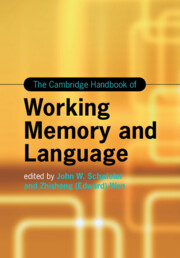Book contents
- The Cambridge Handbook of Working Memory and Language
- Cambridge Handbooks in Language and Linguistics
- The Cambridge Handbook of Working Memory and Language
- Copyright page
- Contents
- Figures
- Tables
- About the Editors
- About the Contributors
- Acknowledgments
- Overview of the Handbook
- Part I Introduction
- Part II Models and Measures
- Part III Linguistic Theories and Frameworks
- 13 Have Grammars Been Shaped by Working Memory and If So, How?
- 14 Branching and Working Memory
- 15 Working Memory and Natural Syntax
- 16 The Role of Working Memory in Shaping Syntactic Dependency Structures
- 17 Working Memory in the Modular Cognition Framework
- 18 Short-Term and Working Memory Capacity and the Language Device
- Part IV First Language Processing
- Part V Bilingual Acquisition and Processing
- Part VI Language Disorders, Interventions, and Instruction
- Part VII Conclusion
- Index
- References
16 - The Role of Working Memory in Shaping Syntactic Dependency Structures
from Part III - Linguistic Theories and Frameworks
Published online by Cambridge University Press: 08 July 2022
- The Cambridge Handbook of Working Memory and Language
- Cambridge Handbooks in Language and Linguistics
- The Cambridge Handbook of Working Memory and Language
- Copyright page
- Contents
- Figures
- Tables
- About the Editors
- About the Contributors
- Acknowledgments
- Overview of the Handbook
- Part I Introduction
- Part II Models and Measures
- Part III Linguistic Theories and Frameworks
- 13 Have Grammars Been Shaped by Working Memory and If So, How?
- 14 Branching and Working Memory
- 15 Working Memory and Natural Syntax
- 16 The Role of Working Memory in Shaping Syntactic Dependency Structures
- 17 Working Memory in the Modular Cognition Framework
- 18 Short-Term and Working Memory Capacity and the Language Device
- Part IV First Language Processing
- Part V Bilingual Acquisition and Processing
- Part VI Language Disorders, Interventions, and Instruction
- Part VII Conclusion
- Index
- References
Summary
Dependency syntax holds that the goal of syntactic analysis is to establish all the binary relations between words in a sentence. This process is closely related to working memory. In a sentence, the words between two syntactically related words make for dependency distance, which is an index of sentence comprehension difficulty because, when the two syntactically related words are combined to each other in working memory, the first of them may suffer from memory decay or memory interference caused by the intervening words. Thus, working memory and the least effort principle may dictate a universal tendency for syntactic structures to be organized in such ways as to reduce dependency distance. This tendency has great shaping effect on the patterns of word order in human languages and is potentially able to account for many linguistic universals in language typology. As for the sporadic long dependency structures motivated by communicative needs, specific syntactic patterns may have evolved, utilizing some cognitive mechanisms to lessen the memory load of these long dependencies. Syntactic structures, therefore, are probably the result of self-adaption of a language system to certain external human constraints and motivations, among which working memory is a very important one.
Information
- Type
- Chapter
- Information
- The Cambridge Handbook of Working Memory and Language , pp. 343 - 367Publisher: Cambridge University PressPrint publication year: 2022
References
Accessibility standard: Unknown
Why this information is here
This section outlines the accessibility features of this content - including support for screen readers, full keyboard navigation and high-contrast display options. This may not be relevant for you.Accessibility Information
- 3
- Cited by
